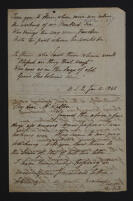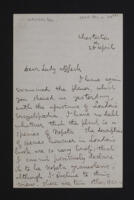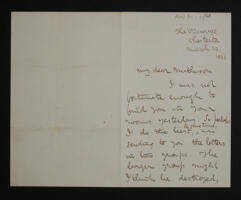Opening of the letter is preceded by a poem of 7 verses by Robert Leslie Ellis dated 12 Jan. 1848.
Writes on philosophy in Cambridge. States that the correspondence of Hare and Whewell gives him the impression 'that there was very little mental philosophy read at Cambridge in their younger days'. Whewell's lectures were very well attended in the early years after he was appointed professor, but the numbers attending declined after he began to develop his new system. Refers to the paper set on philosophy for the Trinity Fellowships, and to Trinity lecturers Thompson and Cope. Refers to his own undergraduate days from 1844 to 1848, and mentions the works on philosophy which were influential at that time: an article of ancient philosophy by [Maurice], and Lewes' Biographical History of Philosophy. Believes that Lewes led him and many of his contemporaries to read J.S. Mill.
States that in St. John's College in his time 'a meagre abridgement of Locke used to be read in the first year, which 'finally disappeared under Roby's zealous efforts to reform [the students].' In relation to mental philosophy in those days, remarks that there 'must have been persons who were fond of [it]', and reports that he say a copy of the French translation of some of Sir W. Hamilton's essays in the private room of the mathematical tutor Mr Hopkins. Relates that Herschel's [Preliminary Discourse on [the Study of] Natural Philosophy 'was a book much read at Cambridge'. Mentions the absence of any account of the Greek Philosophy in Thirlwall's History [of Greece], and the political activity in England consequent on the Reform Bill and its results, as possible causes of the lack of interest in [mental philosophy].
Refers to a perceived 'taste for philosophy' arising in the previous thirty years at Cambridge, and cites theological influences as the possible cause, e.g., Butler's Analogy [of Religion], the sermons of Harvey Goodwin, and Dr Mill's contact with Hare and his Christian Advocate publications. Relates having, with others, admired the Sermons of Archer Butler, and having encouraged Macmillan to buy Butler's manuscripts, and publish the Lectures on Ancient Philosophy. Thinks that they appeared in 1856. Refers to Sir W. Hamilton, who 'became first known to most Cambridge men for his attacks on mathematics and on the Universities', and to W. Walton 'of Trinity Hall formerly of Trin. Coll.'. Adds that in 1834 'Sterling and J.C. Hare and others wanted to found a prize for Essays on the Philosophy of Christianity in honour of Coleridge', but the H[eads] would not allow it. Announces that he shall publish two letters from Whewell to Hare on the subject.
Todhunter, Isaac (1820-1884), mathematician and historian of mathematicsWritten from The Vicarage, Chesterton.
Enquires how much he owes Walton, suggests that he mix in general society and should improve his French, modern history and general knowledge
Aware that without calculus he will not be able to become a Senior Optime, Walton threatening him with the gulph
Still a doubt as to whether he will get his degree, lack of knowledge of the calculus a great disadvantage, cramming geometry and formulae, does exam papers with Walton every day
Reading Aristotle's Ethics I with Shilleto, making slow progress at Mathematics, Walton says CJM has no chance of being among the Senior Optimes while Shilleto thinks he will be in the second class in the Classical Tripos, worried that his performance will disappoint JHM
Opposition for classical prizes very strong, is advised to read mathematics with Walton

![Letters from Robert Leslie Ellis to [William] Walton](/uploads/r/trinity-college-library/1/1/9/11987adda4757c90c67cfbd14c03633a66a8b9bf39dd492c470967d12f265421/Add.ms.c.67.7-8_thumb.jpg)


![Letters from Robert Leslie Ellis to [William] Walton](/uploads/r/trinity-college-library/8/f/3/8f30ec493294eb4cc692d2891708084e56bc00f545bfddcd5a1db6ebf9c42b06/Add.ms.c.67.10-88_thumb.jpg)